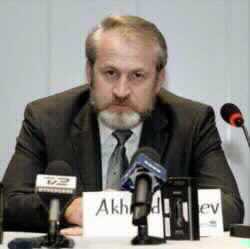HIGLIGHTSFentanyl, a Potent Agent Named Responsible for Nearly All of the 119 Deaths Among the Captives|*|U.S. Ambassador to Moscow: 'Lives Could've Been Saved if Precise Information Had been Given to Medics|*|Russia Liberal Opposition Party, Yabloko: 'Lack of Organisation of Medical Assistance to Victims Verges on the Criminal.; |*| Soviet Scientists Had Worked hard During Cold War on "bio-regulators," Agents That Could Put Entire Cities to Sleep|*| Danish Justice Minister Says Stronger and More Complete evidence Needed if Zakayev Were to Be Extradited|*| Russia Would if Required Provide Guarantees Zakayev Would Not Face the Death Penalty and Would be Granted full Legal Rights|*|
___________
STORY: Russia broke four days of silence and revealed that the gas used to subdue Chechen attackers and end the Moscow hostage crisis was fentanyl, a potent agent responsible for nearly all of the 119 deaths among the captives.
Moscow also demanded the extradition of a top aide to the Chechen deposed elected leadership after he was arrested in Denmark on suspicion of being behind the siege.
Health Minister Yury Shevchenko denied that the gas used in Saturday's special forces operation to free the hostage was banned under chemical weapons conventions and said that the active substance in the gas was fentanyl, a powerful narcotic used as an anaesthetic.
Russian officials had previously refused to specify the nature of the gas whose effects killed most of the 119 hostages who died and has left hundreds of others still in hospital, saying only that it was an anaesthetic-type gas of a kind used in surgery.
US Ambassador Alexander Vershbow said Tuesday that lives could have been saved if precise information had been given out immediately following the operation.
Opiates such as fentanyl affect pain receptors, induce drowsiness and in sufficiently strong doses can cause the respiratory system to seize.
Medics had prepared beforehand more than 1,000 doses of antidote to the incapacitating gas pumped into the theatre to overcome the Chechen attackers, the minister added.
Medics who entered the theatre behind the special forces to help the hostages complained after the operation that they had been given little or no information or preparation and had wholly inadequate material, including a lack of stretchers.
Their claims were echoed by the liberal opposition Yabloko party, which said in a statement: "the (lack of) organisation of medical assistance to the victims... verges on the criminal."
And a US-based rights group called Wednesday for an independent investigation into the raid.
Russia had come under increasing international pressure to divulge the nature of the gas amid lingering suspicions that banned chemicals might have been used, though officials and medical experts in the United States, Germany and Switzerland had all indicated that fentanyl had probably been used.
A senior US official quoted by the New York Times said that if fentanyl had been used, it would not constitute a violation of the 1997 treaty banning the use of lethal chemical weapons because this permits the use of non-lethal chemicals for law enforcement and riot control purposes.
A former intelligence official said Soviet scientists had worked hard during the Cold War on "bio-regulators," agents that could alter mass behavior and even put entire cities to sleep.
A Pentagon spokesman meanwhile said the US military does not possess fentanyl or any other similar incapacitating gas agents.
RUSSIA DEMANDs EXTRADITION OF ZAKAYEV
In another development, Russian Deputy Foreign Minister Valery Loshinin said Moscow hoped that Denmark would "take the necessary steps" to extradite Ahmed Zakayev after the Chechen envoy appeared in a Danish court following his arrest at Russia's request.
A Danish judge, Lisbeth Christensen, ordered the 43-year-old Zakayev detained until November 12, saying there was a risk that he would flee, although his lawyer said he would appeal the ruling.
Zakayev had been attending a two-day international conference on Chechnya in Copenhagen attended by representatives of the Chechen diaspora and non-governmental organisations.
Russia officially filed an extradition request, but Danish Justice Minister Lene Espersen said legal authorities here needed "stronger and more complete evidence" supporting allegations against Zakayev.
Russia declared a moratorium on capital punishment in 1996 but has not formally abolished the death penalty.
A senior prosecutor said Russia would provide written guarantees to the Danish authorities that Zakayev would not face the death penalty and would be granted full legal rights.
Russia has accused Zakayev, an aide to Chechen leader Aslan Maskhadov, of being behind the 57-hour hostage-taking, although he has denied responsibility and condemned the attack in an interview with AFP Monday.
The toll of the hostage crisis rose slightly as two more rescued hostages died overnight, bringing the number of captives killed to 119, the Moscow chief medical officer Andrei Seltsovsky said.
A total of 510 former hostages have been released from hospital but 152 others remain, eight of them in critical condition, Interfax quoted a health official as saying.
PHOTO CAPTION
Akhmed Zakayev, senior representative for Chechnya 's nationalist President Aslan Maskhadov, speaks at a news conference in Copenhagen in this Oct. 24, 2002, file photo. Danish police arrested Zakayev after receiving information from Russian authorities that said Zakayev was suspected of helping prepare the siege of a Moscow theater last week and other acts between 1996 and 1999. (Scanpix/Reuter
- Author:
& News Agencies - Section:
WORLD HEADLINES


 Home
Home Discover Islam
Discover Islam Quran Recitations
Quran Recitations Lectures
Lectures
 Fatwa
Fatwa Articles
Articles Fiqh
Fiqh E-Books
E-Books Boys & Girls
Boys & Girls  Women
Women










